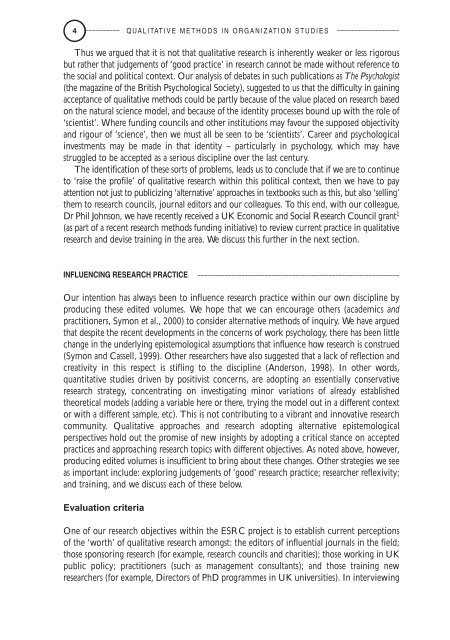essential-guide-to-qualitative-in-organizational-research
essential-guide-to-qualitative-in-organizational-research
essential-guide-to-qualitative-in-organizational-research
- No tags were found...
Create successful ePaper yourself
Turn your PDF publications into a flip-book with our unique Google optimized e-Paper software.
4 –––––––––– QUALITATIVE METHODS IN ORGANIZATION STUDIES ––––––––––––––––––Thus we argued that it is not that <strong>qualitative</strong> <strong>research</strong> is <strong>in</strong>herently weaker or less rigorousbut rather that judgements of ‘good practice’ <strong>in</strong> <strong>research</strong> cannot be made without reference <strong>to</strong>the social and political context. Our analysis of debates <strong>in</strong> such publications as The Psychologist(the magaz<strong>in</strong>e of the British Psychological Society), suggested <strong>to</strong> us that the difficulty <strong>in</strong> ga<strong>in</strong><strong>in</strong>gacceptance of <strong>qualitative</strong> methods could be partly because of the value placed on <strong>research</strong> basedon the natural science model, and because of the identity processes bound up with the role of‘scientist’. Where fund<strong>in</strong>g councils and other <strong>in</strong>stitutions may favour the supposed objectivityand rigour of ‘science’, then we must all be seen <strong>to</strong> be ‘scientists’. Career and psychological<strong>in</strong>vestments may be made <strong>in</strong> that identity – particularly <strong>in</strong> psychology, which may havestruggled <strong>to</strong> be accepted as a serious discipl<strong>in</strong>e over the last century.The identification of these sorts of problems, leads us <strong>to</strong> conclude that if we are <strong>to</strong> cont<strong>in</strong>ue<strong>to</strong> ‘raise the profile’ of <strong>qualitative</strong> <strong>research</strong> with<strong>in</strong> this political context, then we have <strong>to</strong> payattention not just <strong>to</strong> publiciz<strong>in</strong>g ‘alternative’ approaches <strong>in</strong> textbooks such as this, but also ‘sell<strong>in</strong>g’them <strong>to</strong> <strong>research</strong> councils, journal edi<strong>to</strong>rs and our colleagues. To this end, with our colleague,Dr Phil Johnson, we have recently received a UK Economic and Social Research Council grant 1(as part of a recent <strong>research</strong> methods fund<strong>in</strong>g <strong>in</strong>itiative) <strong>to</strong> review current practice <strong>in</strong> <strong>qualitative</strong><strong>research</strong> and devise tra<strong>in</strong><strong>in</strong>g <strong>in</strong> the area. We discuss this further <strong>in</strong> the next section.INFLUENCING RESEARCH PRACTICE ––––––––––––––––––––––––––––––––––––––––––––––––––––––––––––Our <strong>in</strong>tention has always been <strong>to</strong> <strong>in</strong>fluence <strong>research</strong> practice with<strong>in</strong> our own discipl<strong>in</strong>e byproduc<strong>in</strong>g these edited volumes. We hope that we can encourage others (academics andpractitioners, Symon et al., 2000) <strong>to</strong> consider alternative methods of <strong>in</strong>quiry. We have arguedthat despite the recent developments <strong>in</strong> the concerns of work psychology, there has been littlechange <strong>in</strong> the underly<strong>in</strong>g epistemological assumptions that <strong>in</strong>fluence how <strong>research</strong> is construed(Symon and Cassell, 1999). Other <strong>research</strong>ers have also suggested that a lack of reflection andcreativity <strong>in</strong> this respect is stifl<strong>in</strong>g <strong>to</strong> the discipl<strong>in</strong>e (Anderson, 1998). In other words,quantitative studies driven by positivist concerns, are adopt<strong>in</strong>g an <strong>essential</strong>ly conservative<strong>research</strong> strategy, concentrat<strong>in</strong>g on <strong>in</strong>vestigat<strong>in</strong>g m<strong>in</strong>or variations of already establishedtheoretical models (add<strong>in</strong>g a variable here or there, try<strong>in</strong>g the model out <strong>in</strong> a different contex<strong>to</strong>r with a different sample, etc). This is not contribut<strong>in</strong>g <strong>to</strong> a vibrant and <strong>in</strong>novative <strong>research</strong>community. Qualitative approaches and <strong>research</strong> adopt<strong>in</strong>g alternative epistemologicalperspectives hold out the promise of new <strong>in</strong>sights by adopt<strong>in</strong>g a critical stance on acceptedpractices and approach<strong>in</strong>g <strong>research</strong> <strong>to</strong>pics with different objectives. As noted above, however,produc<strong>in</strong>g edited volumes is <strong>in</strong>sufficient <strong>to</strong> br<strong>in</strong>g about these changes. Other strategies we seeas important <strong>in</strong>clude: explor<strong>in</strong>g judgements of ‘good’ <strong>research</strong> practice; <strong>research</strong>er reflexivity;and tra<strong>in</strong><strong>in</strong>g, and we discuss each of these below.Evaluation criteriaOne of our <strong>research</strong> objectives with<strong>in</strong> the ESRC project is <strong>to</strong> establish current perceptionsof the ‘worth’ of <strong>qualitative</strong> <strong>research</strong> amongst: the edi<strong>to</strong>rs of <strong>in</strong>fluential journals <strong>in</strong> the field;those sponsor<strong>in</strong>g <strong>research</strong> (for example, <strong>research</strong> councils and charities); those work<strong>in</strong>g <strong>in</strong> UKpublic policy; practitioners (such as management consultants); and those tra<strong>in</strong><strong>in</strong>g new<strong>research</strong>ers (for example, Direc<strong>to</strong>rs of PhD programmes <strong>in</strong> UK universities). In <strong>in</strong>terview<strong>in</strong>g



